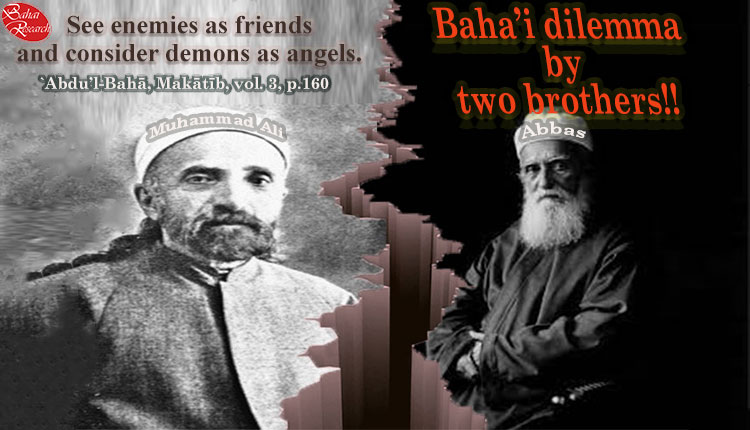Ex-communication and the law of the human rights in the Baha’i Faith
Abstract
If you ask the Baha’is about the Baha’i Faith, you will get this answer: “There isn’t any division or branch in the Baha’i Faith, because of adherence to the Covenant.” They use this statement as a reason to prove the truth of Baha’is.
Let’s take a look at one of the divisions in Baha’i history.
An important will that was not implemented!
Bahá’u’lláh had willed in the Book of the Covenant (Kitab-i-Ahd) that after him first Abbas (Abdu’l-Bahá) and then his younger son (Muhammad Ali) would assume the leadership of the Baha’is.
In this will, Abbas Effendi was named Ghosn Azam (the Greatest Branch) and Muhammad Ali Ghosn Akbar (the Great Branch). But because of the differences that arose between these two brothers, each of them claimed independence at that time and separated. In Bahá’í, the followers of Abdu’l-Bahá were called Thabitin, which means steadfast on the covenant, and the followers of Muhammad Ali Effendi were called the Naaghezin (violators), which means people who violated the covenant.
Baha’i dilemma
Abdu’l-Bahá deposed his brother Muhammad Ali from the succession and replaced his grandson Shoghi Effendi. In this way, the Baha’is were divided into two groups:
The First Group: They followed Shoghi Effendi by referring to the Tablets and Testaments of Abdu’l-Bahá. This group believes that God changed his fate (Bada) in his destiny regarding the succession of Muhammad Ali. This group calls itself Thabitins and other Bahá’ís as non-Bahá’ís, and in principle they do not consider them Bahá’ís. They even banned any communication with them.
The Second Group: Unitarian Baha’is that obeyed Muhammad Ali according the Kitab-i-Ahd believed that Will and Testament of ‘Abdu’l-Bahá is false, because the pepuse of the Kitab-i-Ahd was solving the disagreements among the Baha’is, and it’s not meaningful that God changes his fate in a such important subject.
This subject not only exacerbated the branches in the Baha’i Faith but also a motivation in ex-communication through the leaders of the Baha’is and the family members of Bahá’u’lláh.
After that, ‘Abdu’l-Bahá declared that the communication with his brother (Muhammad Ali) and his fallowers is forbiddon. Also, his sons: Shuaullah, Muhammad Amin, and Musa ex-communicated as Unitarian Baha’is.
The behavior and treatment of two Baha’is brothers!
The fact that according to the will of Bahá’u’lláh, Abbas and Muhammad Ali were supposed to become Baha’i leaders and because of differences between them, the will was not carried out, is not our priority. But the behavior of two brothers in a Baha’i family is a significant issue…
Abdu’l-Bahá, the second leader of the Bahá’ís, had many especial scribes. But among them, a Bahá’í believer named Sobhi took the title of scribe of revelation from him. Therefore, he was trusted and approved by Abbas Effendi. Sobhi, in his book “Payam-i Pedadr” (The Message of Father), deals with the behavior of Abbas Abdu’l-Bahá with his brother Muhammad Ali.
- Payam-i Pedar pp. 102,183, and 114:
“On another occasion “Abdu’l-Bahá’s son-in-law Mirza Jalal” and others on their way to Baha’s tomb ran into Muhammad Ali. they made gratuitous remarks against him and took liberties with him.” Such incidents were not infrequent.
- Payam-i Pedar, pp. 104-105:
“In his meetings attended by his followers exclusively, Abbas Abdu’l-Bahá would dilate on the “bad conduct” of his brother Muhammad Ali and his adherents to the “delectation” of his audience and would “work up feelings of his followers against them. Apprehensive of the dissemination of Muhammad Ali’s utterances among Baha’is, Abbas Abdu’l-Bahá, would sound the alarm that such utterances “were infected with poison which would work into one’s system” and affect if not afflict, any person however strong and robust one may be. He would say “he had seen Muhammad Ali flirting with a girl”.
We leave it up to the truth-seeking and researching Bahá’ís themselves to determine which other Bahá’í sources can be used to study the documents dealing with the ex-communicated Baha’is. But how can the teaching of the unity of the human world be considered a universal mirror for Baha’i with these behaviors?!
Conclusion
Looking at pages of Baha’i history with evidence, this question arises in the mind of every Baha’i:
1- Why don’t Baha’is have the right to know their own history?
2- Why don’t the Baha’is know that they had a split in their faith ?
3 – Why are the Baha’is not allowed to decide for themselves about their historical truth? Before these documents are crushed in the wheels of censorship of the Baha’i organization and Bait al-Adl (UHJ)?
We are waiting for your answers and comments, our friends in the Baha’i Research Website.

